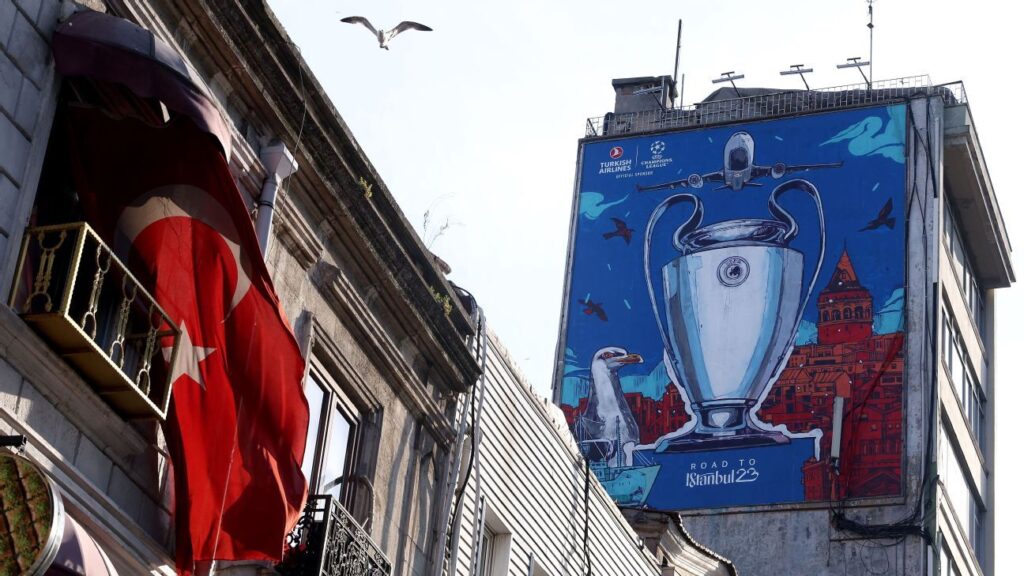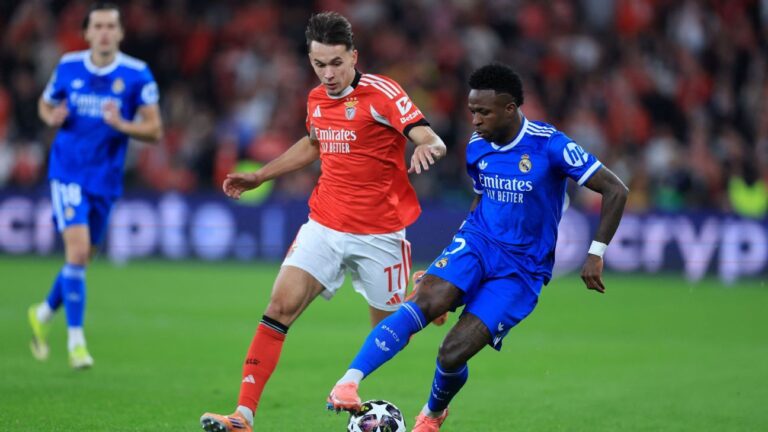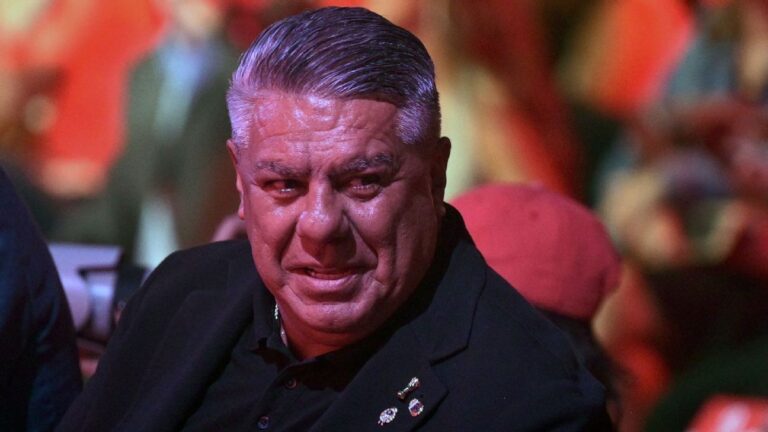ISTANBUL — This city straddling Europe and Asia (you can literally drive across the bridge from one continent to the other) is a fitting venue for a UEFA Champions League final (Saturday, 8 p.m. BST/3 p.m. ET). It’s the European Cup, yes, but the finalists are two Asian-owned teams (Manchester City majority owned by Abu Dhabi; Internazionale by Chinese investors) with global appeal, and this city, founded nearly three millennia ago, is used to being both a nexus and melting pot. When you exist in the place where people, religions and creeds collide and ferment, change is a constant … which might be why Istanbul has changed its name multiple times.
Even today, it’s a crossroads. Look out over the Bosphorus Strait and you might see ships carrying Ukrainian grain escorted by Turkish warships. If you had Marvel-superhero eyesight you could stand on the banks and see Ukraine and Russia in the distance. Turn west, and it’s the European Union; south, and it’s Egypt and the African continent; east, and it’s Syria, then Iraq and Iran and then, the Gulf.
– Stream on ESPN+: LaLiga, Bundesliga, more (U.S.)
It’s no surprise that the national carrier, Turkish Airlines, boasts that it flies to more destinations than anyone else. Other than Australia and the Americas, nothing seems particularly far away.
Maybe that’s why so many foreign players have made a home here. Newly crowned champions Galatasaray, whose red and yellow pennants festoon many of the city’s streets, count Juan Mata, Mauro Icardi, Dries Mertens and Bafetimbi Gomis in their ranks. Rivals Fenerbahce have Michy Batshuayi, Enner Valencia and Joshua King. Besiktas, whose imposing stadium overlooks the Bosphorus, as well as the Dolmabahce Palace, from which the Sultan ruled over the Ottoman Empire, boast Nathan Redmond, Dele Alli and Vincent Aboubakar, the man who lost his job at Al Nassr when Cristiano Ronaldo rocked up.
Football-wise it’s also the city of last hurrahs. Inter should enjoy a fair amount of neutral support at the Ataturk Olympic Stadium on Saturday night and they have no shortage of old-timers and guys looking for a second chance: ex-Premier League veterans such as Henrikh Mkhitaryan, Edin Dzeko and Matteo Darmian; Premier League strugglers such as striker Romelu Lukaku (on loan from Chelsea); two-time cancer-beater turned unwanted free agent turned defensive stalwart Francesco Acerbi; and goalkeeper Andre Onana, who served a nine-month doping ban after inadvertently taking his wife’s medication.
Plus, neutrals generally love an underdog. And Man City are very much favourites. They stand 90 minutes away from hitting the Premier League, FA Cup and Champions League trifecta (or, treble, as they call it in England), a feat achieved by only seven clubs in the history of the game.
Inter finished third in Italy’s Serie A, a whopping 18 points off Napoli at the top of the table (though they did win the Italian Cup.) City have won five of the past six Premier League titles; Inter have won one league title in the past 13 years.
City’s coach, Pep Guardiola, has won 11 league titles and two Champions Leagues and is widely regarded as one of the greatest tactical innovators and man-managers in recent history. As a player, he was the midfield general of Johan Cruyff’s legendary Barcelona “Dream Team” of the 1990s. Inter’s coach, Simone Inzaghi, has won zero league titles and zero Champions Leagues, and many thought he was going to be fired in March. As a player, he was overshadowed by his more extroverted and intense (but less-gifted) brother, Pippo. (To this day, the understated Simone has to remind folks “not to mistake my politeness for stupidity.”)
Both teams have tall centre-forwards. City’s is the 22-year-old goal machine Erling Haaland, who has scored 52 in 52 games this season. Inter’s is 37-year-old Edin Dzeko, an aging free agent signing who went 3½ months without scoring and played for City for five years from 2011 to 2016.
City are owned by members of the Abu Dhabi royal family, who have spent lavishly since their takeover in 2008. So lavishly that UEFA punished them for breaching financial fair play (FFP) rules in 2014 and actually banned them for two years for false accounting in 2020 (a ban that was overturned by the Court of Arbitration for Sport, which found that some charges were not proven and others were outside the statute of limitations). They now face similar charges, this time from the Premier League, but continue to maintain their innocence (and, in fact, say they “welcome” the chance to clear their name.)
Inter are owned by the once-mighty Suning Corporation that, in 2021, had to sell nearly a quarter of its shares to the Chinese government after running into liquidity problems. Before that, they too had been found in breach of FFP. Between that sanction and Suning’s liquidity issues, they have been run on a relatively shoestring budget since then, with the owners issuing bonds to cover debts.
City are undefeated in the Champions League, having dispatched RB Leipzig, Bayern Munich and Real Madrid in the knockout phase. Inter, who lost twice in the group stage, had a distinctly more downhill run to the final, getting past FC Porto (though, in their own Inter way, they nearly threw it away), Benfica and crosstown rivals AC Milan.
I could go on, but you get the point.
It’s very much a case of the nouveau riche (though, after 15 years, you wonder if City will lose the “nouveau” bit and just be “riche”) against the fallen giants. Inter, lest we forget, have been European champions three times and won a treble of their own in 2010. So bruised are Inter that the black and blue of their shirts feels especially appropriate.
In the buildup to the final, Inter laid relatively low, chucking out the usual platitudes about “belief” and that anything can happen in a one-off game. They know they’re playing with house money. Nobody expected them to be here.
City, on the other hand, seemed to enjoy putting even more pressure upon themselves with Guardiola saying that “something would be missing” if the club, for all their domestic success, failed to win the Champions League. Having stumbled in their only other Champions League final appearance — two years ago against Chelsea — it was a curious thing to hear, however honest it may have been. But then, he seems to revel in the pressure.
And yet, it’s football. None of the above will matter once they cross the line on to the pitch. FFP, paychecks, transfer fees, European pedigree, reputations … all of that will disappear when referee Szymon Marciniak blows his whistle. It will be 11 vs. 11 and the men on the pitch will have to prove it all over again.
The script is yet to be written. And while the Ataturk is unlikely to witness the unthinkable drama of 2005 and Liverpool’s comeback from 3-0 down against AC Milan, the truth is we can’t say for sure. It will be in the hands of the players, the coaches and the match officials. And the Gods of Football, of course. They’ll have their say, too.




